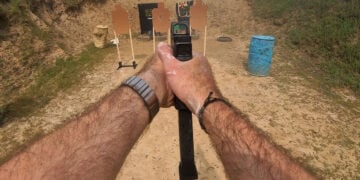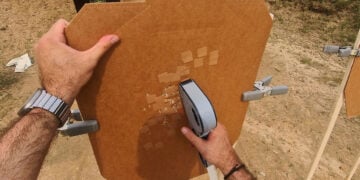Table of Contents
Last week we saw Alabama become the 21st state to pass Constitutional Carry. Yesterday, Ohio Gov. Mike DeWine also signed a Constitution Carry Bill, Senate Bill 215, into law.
01
of 04
When Does Ohio Constitutional Carry Go Into Effect?
Everyone is asking, “When does the new law go into effect?” And there seems to be some confusion about the actual date. Cincinatti.com reported that it goes into effect on June 12, 2022. According to Buckeye Firearm Association, it won’t go into effect until 91 days after it is filed by the Secretary of State. We will keep an eye out for the actual date and update this post accordingly. We will also update our Concealed Carry Maps once the new law takes effect.
02
of 04
Can You Carry a Loaded Handgun in a Vehicle?
There also seems to be some confusion about part of the bill that states:
(C) No person shall knowingly transport or have a loaded firearm in a vessel in a manner that the firearm is accessible to the operator or any passenger.
(D) No person shall knowingly transport or have a firearm in a vessel unless it is unloaded and is carried in one of the following ways:
(1) In a closed package, box, or case;
(2) In plain sight with the action opened or the weapon stripped, or, if the firearm is of a type on which the action will not stay open or that cannot easily be stripped, in plain sight.
Some people read this part and thought that you wouldn’t be able to carry a loaded firearm in a vehicle under the new law. But further in the bill, it states:
(C)(1) For purposes of any provision of section 1547.69, 2923.12, or 2923.124 to 2923.1213 of the Revised Code, or of any other section of the Revised Code, that refers to a concealed handgun license or a concealed handgun licensee, except when the context clearly indicates otherwise, all of the following apply:
(a) A person who is a qualifying adult and is carrying or has, concealed on the person’s person or ready at hand, a handgun that is not a restricted firearm shall be deemed to have been issued a valid concealed handgun license.
This means that a qualifying adult will be able to carry in motor vehicles (2923.12) and vessels (1547.69).
03
of 04
Who Can Carry Concealed Under Ohio’s Constitutional Carry Law?
Senate Bill 215 also defines what a “qualifying adult” is. And anyone that is a “qualifying adult” can carry concealed as if they have a concealed handgun license.
(2) “Qualifying adult” means a person who is all of the following:
(a) Twenty-one years of age or older;
(b) Not legally prohibited from possessing or receiving a firearm under 18 U.S.C. 922(g)(1) to (9) or under section 2923.13 of the Revised Code or any other Revised Code provision;
(c) Satisfies all of the criteria listed in divisions (D)(1)(a) to (j), (m), (p), (q), and (s) of section 2923.125 of the Revised Code
That last part (c) refers to the following:
A person who satisfies the following specified criteria necessary to obtain an Ohio concealed handgun license:
-
- A person who is legally living in the United States;
- A person who is at least 21 years of age;
- A person who is not a fugitive from justice;
- A person who is not under indictment for or otherwise charged with a felony; an offense under R.C. Chapter 2925, 3719, or 4729 that involves the illegal possession, use, sale, administration, or distribution of or trafficking in a drug of abuse; a misdemeanor offense of violence; or a violation of negligent assault or falsification of a concealed handgun license;
- Unless sealed or expunged or a minor misdemeanor, a person who has not been convicted of or pleaded guilty to a felony or an offense under R.C. Chapter 2925, 3719, or 4729 that involves the illegal possession, use, sale, administration, or distribution of or trafficking in a drug of abuse; has not been adjudicated a delinquent child for committing an act that if committed by an adult would be a felony or would be an offense under R.C. Chapter 2925, 3719, or 4729 that involves the illegal possession, use, sale, administration, or distribution of or trafficking in a drug of abuse; has not been convicted of, pleaded guilty to, or adjudicated a delinquent child for committing a violation of assault when the victim of the violation is a peace officer, regardless of whether the person was sentenced under R.C. 2903.13(C)(4) (a penalty enhancement for assault, from a first degree misdemeanor to a fourth degree felony, when the victim is a peace officer, BCII investigator, firefighter, or EMS provider and the assault occurs while they are in the performance of their official duties); and has not been convicted of, pleaded guilty to, or adjudicated a delinquent child for committing any other offense that is not previously described that is a misdemeanor punishable by imprisonment for a term exceeding one year;
- Unless sealed or expunged or a minor misdemeanor, a person who, within the past three years, has not been convicted of or pleaded guilty to a misdemeanor offense of violence other than a misdemeanor violation of resisting arrest or a violation of assault when the victim of the violation is a peace officer, or a misdemeanor violation of falsification of a concealed handgun license; and has not been adjudicated a delinquent child for committing an act that if committed by an adult would be a misdemeanor offense of violence other than a misdemeanor violation of resisting arrest or a violation of assault when the victim of the violation is a peace officer or for committing an act that if committed by an adult would be a misdemeanor violation of falsification of a concealed handgun license;
- Except as provided in the second preceding dot point, a person who, within the past five years, has not been convicted of, pleaded guilty to, or adjudicated a delinquent child for committing two or more violations of assault or negligent assault;
- Unless sealed or expunged or a minor misdemeanor, a person who, within the past ten years, has not been convicted of, pleaded guilty to, or adjudicated a delinquent child for committing a violation of resisting arrest;
- A person who has not been adjudicated as a mental defective, has not been committed to any mental institution, is not under adjudication of mental incompetence, has not been found by a court to be a mentally ill person subject to court order, and is not an involuntary patient other than one who is a patient only for purposes of observation;
- A person who is not currently subject to a civil protection order, a temporary protection order, or a protection order issued by a court of another state;
- A person who currently is not subject to a suspension of a concealed handgun license or a temporary emergency license under certain circumstances or a similar suspension imposed by another state regarding a concealed handgun license issued by that state;
- If the person is not a United States citizen, a person who is an alien and has not been admitted to the United States under a nonimmigrant visa;
- A person who has not been discharged from the armed forces of the United States under dishonorable conditions;
- A person who has not been convicted of, pleaded guilty to, or adjudicated a delinquent child for committing a violation of domestic violence or a similar violation in another state.
04
of 04
Will Ohio Still Offer Concealed Handgun Licenses?
Yes. The Ohio Concealed Handgun License system will stay in place. Residents and Non-Residents will still be able to apply for a concealed handgun license. This will give license holders reciprocity in other states which is not available to anyone without a license.









